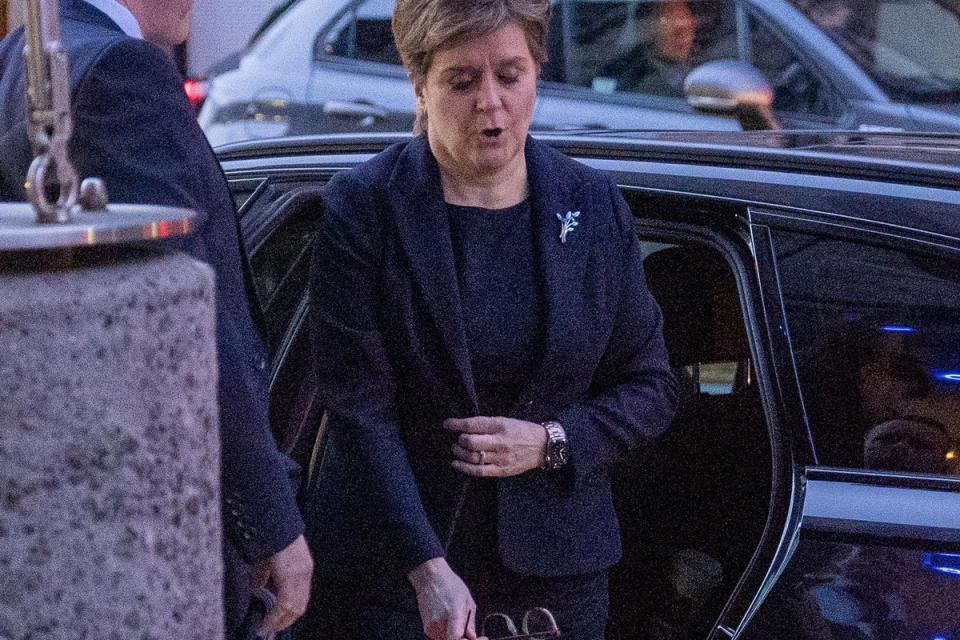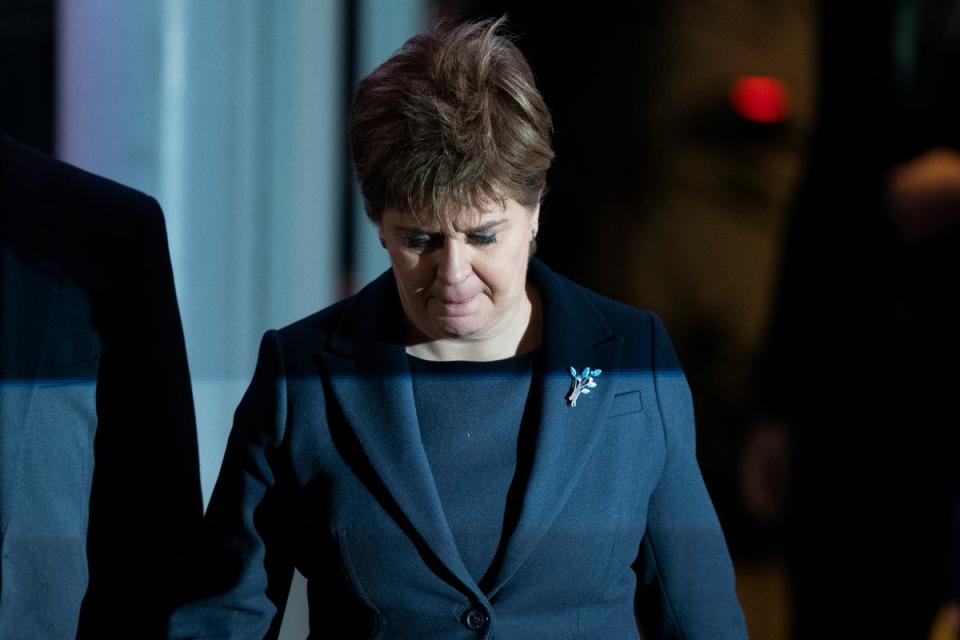Tearful Nicola Sturgeon admits deleting WhatsApps – but denies politicising Covid crisis
Scotland’s former first minister Nicola Sturgeon fought back tears at the Covid inquiry as she denied using the pandemic for political purposes.
The ex-SNP leader choked up as she rejected claims that she had pushed for fights with Boris Johnson’s government to boost her Scottish independence cause.
She insisted that she had not been “thinking of political opportunity”, as she was grilled about WhatsApps which showed she wanted public arguments with Mr Johnson.
Ms Sturgeon also finally admitted that she had deleted her own WhatsApp messages with officials and ministers, but attempted to play down the importance of the messages.
The former first minister said she “did not make extensive use of informal messaging” – claiming that her officials’ discussion of deleting messages was merely “light-hearted” banter.
And she became visibly emotional as she spoke of being “overwhelmed” at times during the crisis. “There’s a large part of me wishes that I hadn’t been, but I was, and I wanted to be the best first minister.”

It came as Ms Sturgeon vehemently denied that the government had politicised the pandemic to pursue Scottish independence, stating that would have been “robbing people of their livelihoods” and would “absolutely” have been a betrayal of the Scottish public.
She told the Covid inquiry that she had never thought less about Scottish independence as she did during the course of the pandemic.
The former SNP boss also said that she “will absolutely assert” that no decisions were made for political reasons, “or that were influenced in some way by considerations for the constitutional argument".
Tory cabinet minister Michael Gove previously accused the Scottish government of seeking “political conflict” with Westminster government during the pandemic.
Messages between Ms Sturgeon and her top adviser Liz Lloyd showed they had discussed a “good old-fashioned rammy” with Boris Johnson’s government over the furlough scheme. It emerged that Ms Sturgeon called Mr Johnson a “f***ing clown”, while Ms Lloyd said she sought a “spat with a purpose”.
The former SNP leader, fighting back tears, told the inquiry: “The idea that in those horrendous days, weeks, I was thinking of political opportunity” was “not the case”. She added: “It wasn’t true.”
Sturgeon cabinet meeting minutes from June 2020 show that her ministers agreed to consider how the Covid crisis could be used to boost support for Scottish independence.
But Ms Sturgeon pointed to a 2020 letter from her then constitution secretary, Mike Russell, to Mr Gove saying the Scottish government was suspending all work on an independence referendum.

Ms Sturgeon apologised when grilled about her statement to a Channel 4 journalist during the Covid crisis saying she would be fully transparent in allowing access to her WhatsApp messages. She said she could have been more “clear”.
She admitted that she deleted these informal messages – but said it was in line with official advice because “salient” points were all recorded on her government’s corporate record.
Amid the storm of controversy over deleted messages, Ms Sturgeon conceded that WhatsApp had become “too common” a means of communication within the Scottish government during the crisis.
But she insisted that she exchanged WhatsApps with no more than a “handful” of people – including key ally Ms Lloyd, and the now first minister Humza Yousaf, who was health secretary.
The ex-SNP leader also dismissed messages sent by senior civil servants and officials about the deletion of WhatsApp messages as “light-hearted”.
Ken Thompson, the Scottish government’s director-general for strategy, wrote in August 2020 that “plausible deniability are my middle names”. He also told colleagues they should “know where the ‘clear chat’ button is” on WhatsApp.
Ms Sturgeon said: “I look at that exchange and what I don’t see is an exchange about the decisions that were taken, I see a light-hearted discussion between officials.”
Scottish Labour leader Anas Sarwar said Ms Sturgeon’s behaviour has “smashed” trust in the SNP, as he accused the Scottish government of having a “culture of secrecy and cover-up”.
The Scottish Conservative leader Douglas Ross said the inquiry hearings had shown Ms Sturgeon to be a “liar” and a “fraud”, as he accused the former first minister of “destroying vital evidence”.
And one of the Scottish Covid Bereaved group said Ms Sturgeon’s “crocodile tears aren’t washing with me” as they reacted to her evidence. Pamela Thomas lost her brother, James Cameron, said: “I don’t think they’re capable of actually telling the truth or being transparent.”
Meanwhile, Ms Sturgeon also rejected accusations of “secrecy” during the pandemic. She claimed she did not have “carte blanche” to make decisions on her own, as she was grilled about her so-called “gold command” meetings of only senior cabinet ministers.
Inquiry counsel Jamie Dawson KC put it to her that she “did not like light to be shone” on the way decisions were taken. “I would very strongly refute that,” Ms Sturgeon replied. “I did not have carte blanche, wide latitude to take decisions – and nor should I have had.”
Ms Sturgeon confirmed that no minutes were taken of the gold command meetings. “There were not minutes taken of them in the way you would have cabinet minutes because they were not decision-making meetings.”
Defending small meetings, she told the inquiry she did “not have a great deal of patience” with the idea of “everybody” wanting to be in the room – saying said there was a tendency for a “cast of thousands” to want to be in the room with her.
And Ms Sturgeon also admitted that it was a mistake to use a SNP email account to conduct some government business with public health expert Professor Devi Sridhar. “On reflection, perhaps I shouldn’t have done that.”
Ms Sturgeon also said she regretted not locking down “a week, two weeks” earlier than Mr Johnson’s UK government did. She said it was one “of the many regrets I have”.

 Yahoo News
Yahoo News 
